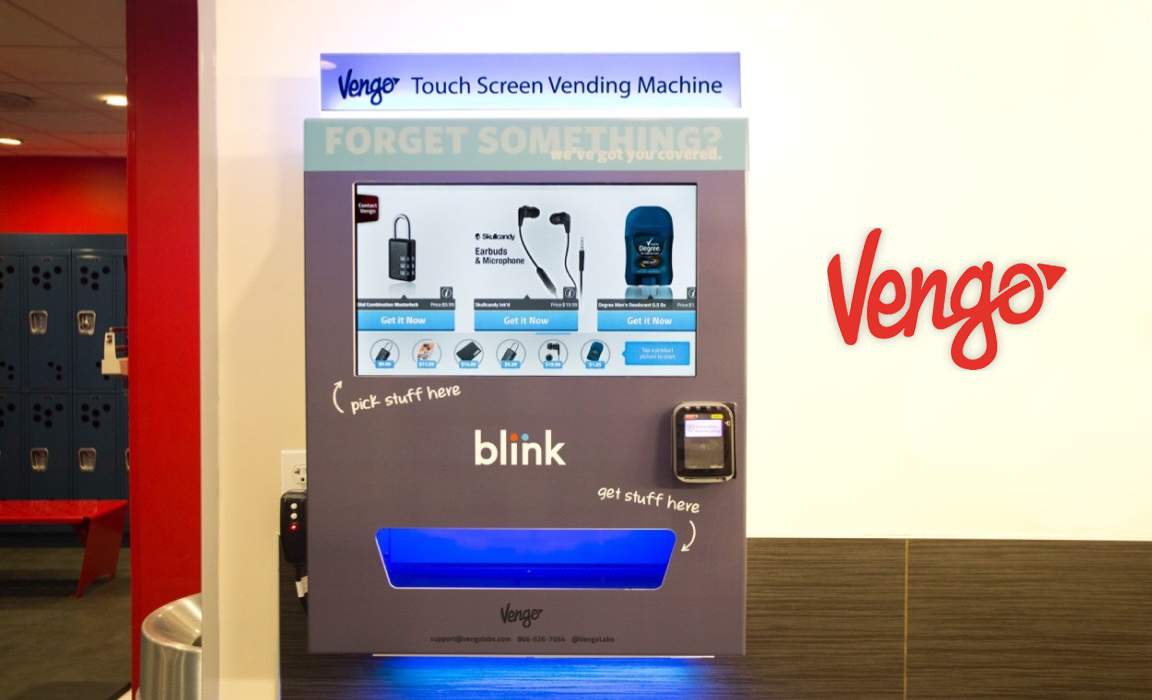If you’ve been around campus, you might’ve spotted or used these sleek, compact, modern-looking vending machines attached to the walls of some rooms. They’re a lot smaller than your traditional vending machines, only about the size of a small suitcase. They have a vibrant color scheme – often white and red, with lights glowing through the edges of the machine. The design is somewhat like a robot’s face – there’s a big screen on the top with a rectangular “mouth” on the bottom where items are dispensed. This futuristic machine is called a “Vengo”, there’s one in the NYU Entrepreneurial Institute that sells anything from staplers to phone chargers. Behind these machines is Brian Shimmerlik and his $50 million startup, Vengo Labs.
Brian received a Bachelor’s degree in Finance and Accounting from the University of Michigan’s Ross School of Business. He started his Finance career doing interest rate risk analysis and portfolio analytics at JP Morgan. However, Brian didn’t get satisfaction from his work. “[I thought to myself]: ‘this isn’t the right job for me’,” says Brian, “I decided to apply to business school thinking that it would be the right avenue for me to try to explore a different career path.” That’s when Brian came to NYU Stern for his MBA.
The summer before entering Stern as a full-time MBA student, Brian interned at an NYC tech startup, Conductor Inc. He was making minimum wage alongside unemployed college grads. In two weeks, Brian went from running reports for an Accounts Manager to being the right-hand man to the CEO of the startup. This was something new to Brian, who had just spent six years in the hierarchy-heavy Banking Industry. “I was so inspired by the passion that people had,” recalls Brian, “the work ethic, but also the casualness of the environment, and that people really just wanted to be there because they’re passionate about what they did.” This experience gave Brian the new career direction he was looking for: startups and VC.
On a typical New York City night, Brian hopped in a taxi home after a night out with his MBA friends. That’s when the idea struck him: “There should be snacks available to me in this taxi.” With this kernel of an idea, Brian worked on a presentation and business model and spoke with anyone who has ever invested in or started a startup. He came across the New York Business Plan Competition the day before submissions were due and spent the night getting his submission in. Brian ended up winning the whole competition, received $17,000 in funding, and appeared on the inside cover of The New York Post.
With the grant money, Brian started assembling a team. He found a technical cofounder at NYU Tandon on the Robotics Team and built Vengo’s first prototype, which led to their $1M seed round. “We quickly realized that the idea was going to be challenging to execute,” Brian describes, “Safety, crash testing, regulation, governments… And so, from a startup perspective, I saw that that was not going to be a recipe for quick traction and growth.” And so Brian pivoted Vengo to deploy in other avenues like bars, gyms, and office buildings. That’s when they hit their stride.
Today, Vengo has over 1500 machines deployed across the US. They’re on over 45 campuses including NYU and Harvard, hotels like Hyatt, subways, gyms, and retail stores. Recently, Vengo pivoted again into the AdTech space. “A large portion of our resources are allocated as a pure software company,” says Brian, “We saw that a lot of our profit was driven by the actual digital screen, not just the products that we were selling and sampling.” Brian discovered that the value of the vending machines is great, but the screens have even greater value. Throughout the years as Vengo was selling and managing their vending machines, they developed software that powers their network of screens for internal use. They found that this technology can be monetized to utilize other screens like an idle TV in a cafeteria. This most recent pivot came during COVID when quarantine made a dent in Vengo’s revenue and forced them to invest in new streams of revenue.
“We’re very much a media company,” says Brian, “we take our reach and attention that our network gets, and monetize with brand sponsors and different advertising partners.” Vengo calls this Digital Out of Home (DOOH) media. Data has shown that Vengo attracts over 1M active engagements per month with an average of 38 seconds per engagement. Their screens also reach over 460 million eyeballs each month, and all this attention is extremely valuable to Advertisement Agencies and CPG brands.
Vengo has two lines of business: hardware and software. For hardware, Vengo makes two types of vending machines. The Vengo is the startup’s signature six-inch thick vending machine that can “fit anywhere” and turn unused wall space into assets. The VengoXL is a larger version of the Vengo that resembles more of a traditional vending machine. For software, Vengo’s DOOH Media platform works with brands and ad agencies to track metrics with a data-driven approach. Their service can also turn any screen into an advertisement stream by just plugging in an idle screen to a Vengo device.
The Vengo is in “idle mode” most of the time and the screen plays 15-second promotions on repeat. With its foot-traffic sensing technology, when a user walks up to a Vengo the screen enters “engage mode”. This mode allows the user to buy things just like traditional vending machines, but it also allows the user to take optional surveys for free samples. When a user is done selecting the products, he or she pays digitally and the items are dispensed at the bottom. While the item is being dispensed, the user is presented with a paid advertisement. The Vengo then goes back into idle mode. This smart engagement approach to vending machines makes Vengo great for brands to sample and understand the ROI and conversion of their products, as well as promote new products to the users. The paid advertising can also be deployed strategically. For example, an airline company would use Vengo’s ad services to deploy promotions on Vengo machines in hotels but not gyms.
Vengo’s grant-winning business model plays a big part in their success. For their hardware, Vengo makes it free to location partners to install their machines. Vengo even shares a part of the revenue to their location partners, so it’s very easy to deploy new machines at different locations – why would anyone turn down an additional amenity to their facility and some monthly cash. Then, on the backend, Vengo sells their machines for $3100 apiece with a $20/month software fee to traditional vending machine deployment companies that have boots on the ground installing and restocking vending machines. Vengo sits in the cloud and monetizes with its software and networks. With their software, instead of a traditional subscription SaaS model, Vengo charges a commission on the advertisement revenue brought in with their service. Much like how ad agencies buy billboard ads, Vengo sells them “digital billboards” and makes their money there. This innovative model takes hardware integration off the hands of Vengo, separating them from a boring, unscalable, traditional infrastructure company to a scalable, high-growth, “VC-sexy” SaaS AdTech startup.
Brian and his cofounder Steven Bofill (Chief of Design) appeared on an episode of Shark Tank in March 2016 (Season 7 Episode 22), where they were backed by Sharks Kevin O’Leary and Lori Greiner for $2 million. Shortly after, Vengo raised a $2 million Series A from Cherry Tree Investments, Scout Ventures, and Colle Capital Partners. Then, in 2019, Vengo raised a $7 million Series B led by Arcade Beauty.
Over the next few months, Brian wants to continue to develop Vengo’s advertisement pipeline. “In six months, I would expect the number of screens we represent to triple,” Brian says, “and in three years, I would expect us to be acquired by someone in the Digital Out of Home world, and to be representing a significant portion of the industry.” Brian is a frequent speaker at Stern and believes in giving back to the community. If you’re a student at Stern and have the chance to attend one of his talks, his journey from Banking to startups is truly inspirational and will teach you a ton.

